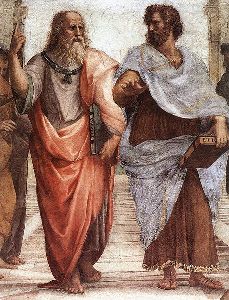I noticed a copy of The Pocket Aristotle on my shelf the other day. It reminded me of an interesting section under the heading Metaphysics, where Aristotle describes the difference between and the value of Knowledge and Wisdom.
Knowledge and Wisdom
 Aristotle describes knowledge as being an understanding of things through experience. “For men of experience know that the thing is so.” It’s like knowing that fire is hot, water is wet, a kiss is awesome, and the sun is bright. This is knowledge and it can only come through experience.
Aristotle describes knowledge as being an understanding of things through experience. “For men of experience know that the thing is so.” It’s like knowing that fire is hot, water is wet, a kiss is awesome, and the sun is bright. This is knowledge and it can only come through experience.
However, knowledge has a shortcoming. Just because someone may have experienced heat from a fire, wetness from water, awesomeness from a kiss, or brightness of the sun, that person is not always able to explain the why of it. “For men of experience know that the thing is so, but do not know why.” The why of it is not found in the knowledge of experience. Knowledge does “not tell us the ‘why’ of anything – e.g. why fire is hot; they only say that it is hot.”
Wisdom then, is an understanding of why things are the way they are – why fire is hot, why water is wet, why a kiss is awesome, and why the sun is bright.
There are people who can have both wisdom and knowledge, they have experienced heat from fire and they know why the fire creates heat. Or, there are people who only have one, knowledge or wisdom. I think of people who only have knowledge as being like those who experience life and go through it without asking why. They travel the world, work their whole life, know the heat of the sun, but not once do they ask why. I can’t stop thinking about “the unexamined life is not worth living.” Was that Plato or Socrates? Those who have wisdom, in my mind, are like academics or students – they understand the theory behind heat, but they’ve never been camping and felt the heat of a fire. I know many people who are textbook geniuses, but have never been “in the trenches” of life, they don’t know what it is to feel the heat of the fire.
Aristotle suggests “men of experience succeed better than those who have theory without experience.” This makes me think of college, where my favorite teachers were always those who had worked in their field for a years before teaching. Not only did they know the fire was hot, they likely were burnt by it. That makes their explanation of why it’s hot that much more valuable.
Making Connections with Knowledge and Wisdom
I thought of a number of connections while writing this piece. First, I kept thinking about the hiring process for employers. Employers want people with wisdom and knowledge; however, if you only have one, knowledge (someone with years of experience) will always be who they hire over wisdom (some bright kid from a great college with great grades). Second, to be wise, I believe, is to have both knowledge and wisdom. It seems like we spend most of our lives trying to gain wisdom (going to school to understand the why of everything), but we never have real knowledge (experience) until we enter the work force or leave home. That seems backwards. Third, knowledge is like knowing a tree in the forest (knowing things from experience, like touching a tree or smelling it or climbing it), but wisdom is understanding the forest (why they grow etc). The metaphor I’m getting at is knowledge is knowing the micro, the tree, and wisdom seems to be the macro, the forest, or understanding the big picture. Knowledge vs wisdom is like micro vs macro.
What other connections can you make using these concepts of knowledge (experience) and wisdom (understanding the why)?






There is a good book I just finished that ties in with this.
Practical wisdom by Barry Schwartz.